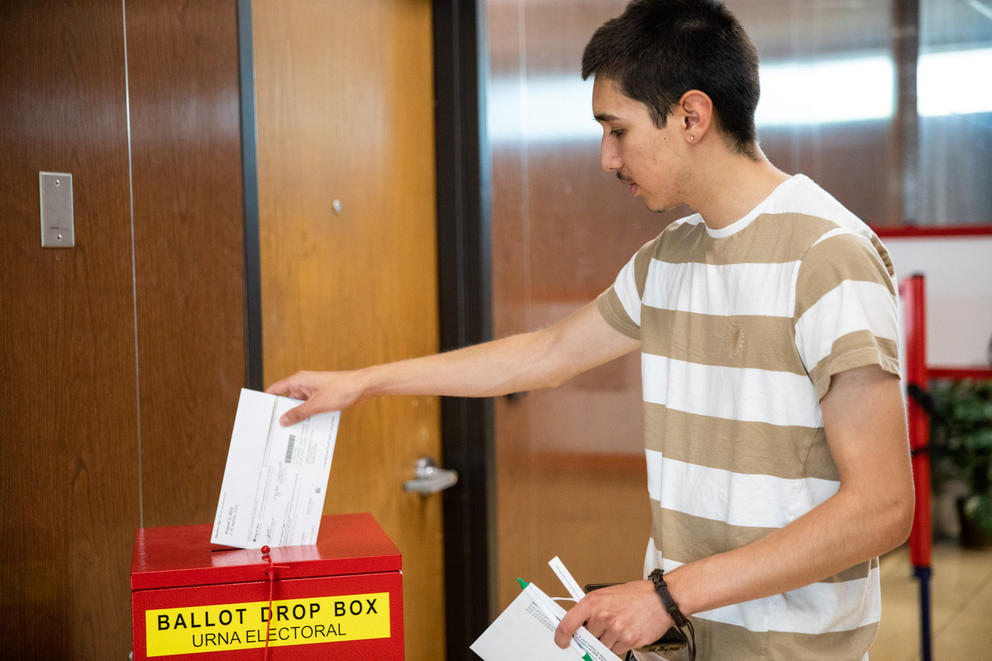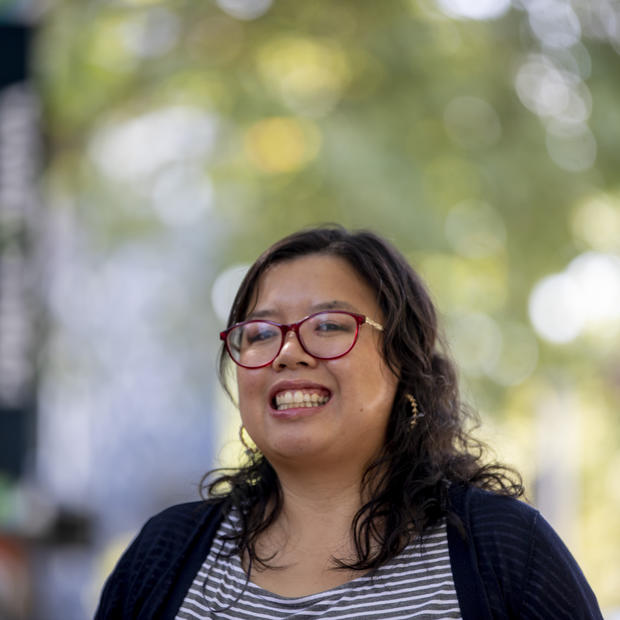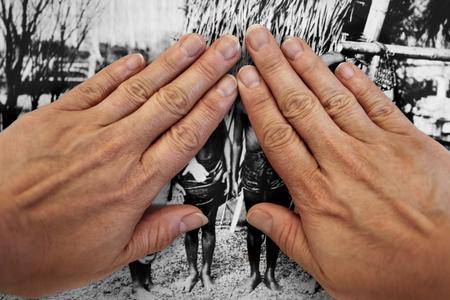Last month, U.S. District Court Judge Robert Lasnik issued a judgment in favor of Latino voters in Central Washington who filed suit over the redrawn 15th Legislative District, stating that despite meeting the required percentage of Latino voters, it’s drawn in a way that dilutes voting power.
Lasnik agreed with the plaintiffs in the case, known as Palmer v. Hobbs, stating that the current boundaries of the district, combined with the social, economic and historical conditions in the Yakima Valley, created inequality in the electoral opportunities between white and Latino voters in the region.
Now the Washington State Legislature has to decide whether to reconvene the bipartisan Washington State Redistricting Commission – something never done in the commission’s four-decade tenure – to redraw the district ahead of an early January deadline, or pass the task on to the court.
Several Republican and Democratic leaders contacted by Crosscut were contemplating the next steps, but one leader was more direct: Reconvening the redistricting commission seemed unlikely.
“We haven’t made any final decisions,” said House Majority Leader Rep. Joe Fitzgibbon, D-West Seattle, about the House Democratic caucus. “But it seems unlikely to me that we would be successful [with a reconvened commission] and that it wouldn’t be worth the time and money to get to that point when we know Judge Lasnik is capable and prepared to solicit maps from the parties of the lawsuit.”
Senate Republican Leader John Braun, R-Centralia, however, felt the Legislature should take action quickly and vote to reconvene the commission.
“The Legislature should do its duty and call itself back into session for this purpose. I would urge that we do so immediately,” Braun said in a written statement Monday.
Meanwhile, a group of Latino voters who intervened in Palmer look to go in a different direction: Voters Jose Trevino and Ismael Campos as well as State Rep. Alex Ybarra have appealed Lasnik’s judgment to the 9th Circuit Court of Appeals.
They argue that Latino voters’ desired candidates losing elections in the 15th District may have less to do with race and more to do with partisanship, and that political cohesiveness among the Latino community is not static.
What’s next
According to the ruling, the state has until Jan. 8, 2024 to tell the judge whether the commission reconvened and submitted a revised map to the Legislature. The Legislature in turn has until Feb. 7, 2024 to adopt and enact the map.
If the commission does not reconvene and the decision falls to the court, all parties, including the plaintiff and the state, have until Jan. 15, 2024 to present proposed maps to the court.
Derrick Nunnally, spokesman for the Secretary of State’s Office, said that Secretary Steve Hobbs is prepared to provide resources, including census data and maps, to either the redistricting commission, if they reconvene, or to Lasnik and the court, if the Legislature does not reconvene it.
According to state law, both chambers of the Legislature need a two-thirds vote to reconvene the Washington State Redistricting Commission, which normally meets every 10 years. And as the Jan. 8, 2024 deadline falls on the same day as the start of the regular session, it means that the Legislature would have to take the reconvening vote during a special session.
Either the legislature or the governor can call a special session. In recent years, it’s been Gov. Jay Inslee who’s made that call, most recently in May to work on a new drug possession law.
The Governor’s Office would leave this decision in the hands of the legislature, said communications director Jaime Smith. “Given this is a process wholly in the hands of the Legislature, we will defer to legislative leaders to determine their course of action,” she said in a written statement. “The Legislature has the ability to call itself into special session.”
The Legislature requires a two-thirds vote of each chamber for this decision as well – so that move has been rare. Fitzgibbon, the House Majority Leader, said this has not happened once in the 13 years he’s been in office.
Legislators may be wary of spending the time and money – roughly $100,000 – for a special session, especially if it’s uncertain whether all four caucuses want to reconvene the commission, Fitzgibbon said.
There’s also a question of whether the commission could agree on new legislative boundaries that would resolve the voting-rights violation in the Yakima Valley. Pinning down a Latino-voter-majority district was one of the most challenging issues of the original redistricting process, he said.
“It would seem hard to justify a special session given what we know about the process,” Fitzgibbon said.
Fitzgibbon said getting feedback from Latino voters, including those affected but not part of the lawsuit, before the caucuses proceed is also essential.
Senate Majority Leader Andy Billig, D-Spokane, confirmed that there are ongoing discussions but couldn’t provide further comment, according to Aaron Wasser, communications director of the Washington Senate Democrats.
In a written statement to Crosscut, State Sen. Rebecca Saldaña, D-Seattle, who testified in support of the plaintiffs during the Palmer trial, said she was happy with the outcome of the case.
"We really care about the Voting Rights Act and making sure people in the Yakima Valley can vote for who they want," Saldaña said. "We're talking about how to make sure the maps for voting are right by March 2024, like the law says."
In his written statement, Braun, the Senate Republican Leader, felt it was best to reconvene the Redistricting Commission.
“A commission is constitutionally required to do the redistricting in a fair, bipartisan manner which favors no political party,” Braun said in his statement. “If majority leadership prevents the Legislature from reconvening the Redistricting Commission, it will be another effort on their part to abdicate our duty and authority to another branch of government for political gains.”
House Republican Leader Rep. Drew Stokesbary, R-Auburn, declined to comment, according to John Handy, communications director for Washington State House Republicans.
Stokesbary is part of the legal team representing Benancio Garcia III, a Yakima Valley resident who contended that the redrawn 15th District was an illegal gerrymander. The three-judge panel majority, which included Lasnik, dismissed the case on Friday, stating that since the legislative district was deemed invalid under the federal Voting Rights Act and will be redrawn, Garcia no longer has a “live grievance,” and the case is moot.
“Since LD 15 has been found to be invalid and will be redrawn (and therefore not used for further elections), the Court cannot provide any more relief to Plaintiff,” the court said in its ruling.
The legal team, including Stokesbary, also represented Ybarra, Trevino and Campos, the people who intervened in Palmer and appealed Lasnik’s ruling.
Simone Leeper, legal counsel for the Campaign Legal Center, which co-represented the plaintiffs in Palmer, said plaintiffs plan to oppose the appeal and push to keep the current timelines in place.
One election under the redrawn LD15
As Palmer proceeded, the 2022 primary and general elections were conducted with the redistricting commission’s original maps.
In the two state representative races in the redrawn 15th District, incumbent Bruce Chandler and candidate Bryan Sandlin, both Republicans, ran uncontested and won their seats.
In the 15th District state Senate race last fall, Nikki Torres, a Republican Latina candidate from Pasco, initially ran unopposed before Democratic opponent Lindsey Keesling, a schoolteacher, entered the race through a write-in effort during the primary.
Torres defeated Keesling in the general election with 67.68% of the vote.
Conservatives saw the election of Torres and state Rep. Alex Ybarra, who ran unopposed in the 13th Legislative District, as an indicator that not all Latinos align with Democratic viewpoints. Several conservative Latina candidates nationwide have prevailed in elections in 2022.
Mark Owens, a political science expert who testified on behalf of conservative Latino voters who intervened in Palmer, said the split between Keesling and Torres was 52% to 48%, which he interpreted as a lack of cohesion among Latino voters.
However, Loren Collingwood, a voting expert who testified during the Palmer trial, said his estimates showed upward of 60% to 68% of the Latino vote in the district was for Keesling.
Outside of the 2022 State Senate race, though, political experts showed that Latino voters in the region – in the 70% range– generally favored the same candidate in races held in the past decade.
Indeed, the recent Palmer ruling affirms once more that despite voter majorities, the candidates preferred by Latino voters in the Yakima Valley and the surrounding area have been on the losing side of elections at all levels, said Leeper of the Campaign Legal Center.
“The fact these voters have time and time again had to go vindicate their [voting] rights to the court says two things; one, it’s a persistent problem they haven’t been able to solve through advocacy and two, it speaks to the conditions [that] these voters have been up against,” she said.
Judge Robert Lasnik said in the ruling that the Latino community’s preference of Democratic candidates shouldn’t distract from whether or not electoral systems impact Latino voter power.
“There is no indication in Section 2 [of the Voting Rights Act] or the Supreme Court’s decisions that a minority waives its statutory protections simply because its needs and interests align with one partisan party over another,” Lasnik wrote.
Voting rights – and voting-rights lawsuits – in the Yakima Valley have shaped both local politics and national policy in the past decade. In 2014, federal courts ruled against the city of Yakima's at-large council elections, leading to district-based elections. As a result of the change, several Latinos and Latinas have been elected to the Yakima City Council, which had never happened before the ruling.
In 2021, Yakima County settled with voters in a lawsuit under the state’s Voting Rights Act, leading to a district-based general election for its Board of County Commissioners. Previously, to choose its three commissioners, the county had a district-based primary election but an at-large general election.
Lasnik’s court ruling acknowledged that while there’s been progress with voter access for Latinos in the region, the redrawn 15th District was ultimately not in compliance with the federal Voting Rights Act.
“While a detailed evaluation of the situation in the Yakima Valley region suggests that things are moving in the right direction thanks to aggressive advocacy, voter registration and litigation efforts that have brought at least some electoral improvements in the area, it remains the case that candidates preferred by Latino voters in [the 15th District] usually go down in defeat given the racially polarized voting patterns in the area,” Lasnik wrote.
In a written statement to Crosscut, State Sen. Torres said she is “not sure what the court’s ruling means moving forward” but that she is not focused on that.
“My job is to listen to the people of the 15th Legislative District, work towards bipartisan, commonsense solutions to address their concerns and represent them to the best of my ability.” Torres wrote. “That has been my focus since being sworn into the Senate, and it will continue to be my primary focus going forward.”
Keesling, who also serves as chair of the Yakima County Democratic Central Committee, said that a candidate needs to represent not just by being the same race or ethnicity but also be able to show an interest in the community's needs.
“I do hope in the future, the community is able to self-advocate and get people who speak directly to their needs,” she said. “It’s frustrating they are essentially throwing their ballots into their trash because they don’t know there is a candidate that’s actually representing their needs.”
Keesling also saw first-hand the consequences of the arbitrary boundaries of her district. Keesling said it was possible to go just a few blocks away from her home, southeast of downtown Yakima, and be in an entirely different district.
During a walk around her neighborhood, which has a robust Latino population, she could bounce in and out of the 14th and 15th districts.
Keesling hopes there’s more community feedback in the redrawing process and, ultimately, that the redrawn maps better reflect the cohesiveness of the Latino neighborhoods in the Yakima Valley and the surrounding areas.
Latinos are “putting up an incredibly bold fight to actually try to get the ability to advocate for themselves,” she said. “I hope they’re successful.”
Prepared to step in
Leeper of the Campaign Legal Center said she and others representing the plaintiffs would be prepared to submit proposed maps to the court if the state Redistricting Commission doesn’t reconvene.
The maps may look different from the ones Latino voter advocates submitted in 2021 to reflect demographic data. The maps submitted in 2021 likely used census data from 2019, she said.
The new maps will affect a handful of districts – including the neighboring 14th District, which includes communities with robust Latino populations.
One possible proposal – one made by plaintiffs in proposed maps filed in the court case – is redrawing the map so the 14th is the Latino-majority district instead of the 15th. Doing so, Leeper said, would enable the state Senator to be up for election during presidential years, when Latino voter turnout is higher.



